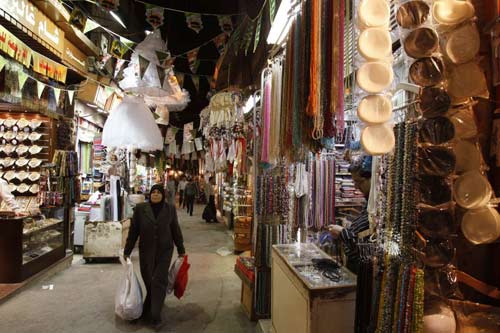Take a trip to Damascus – you'll be converted
The Syrian city is this year's Unesco Arab Capital of Culture. It's just one way the locals are encouraging tourism, says Matthew Bell

My heart sank as the official at Damascus airport asked to see my passport a second time. I had a correct visa; I had remembered not to say I was a journalist – what could he have spotted? He counted the pages to make sure none were missing, then, handing it back, his face broke into a wide smile. "Welcome to Syria!"
The next 10 days were punctuated by similar pangs of paranoia followed by the shame of misplaced suspicion, as taxi drivers invited me into their homes for glasses of tea and passers-by yelled "you are welcome!".
The truth is I had had no idea what to expect from a country supposedly part of the axis of evil. How welcome would a Westerner be in this police state, known for being pally with Iran and Hizbollah?
Tourists are few, but Syria is no stranger to incomers: as a neighbour to Iraq, it has welcomed hundreds of thousands of displaced families.
Sprawling over a plain and creeping up into the foothills of the anti-Lebanon mountain range, Damascus is home to more than 6 million people. As a tourist, there is rarely any need to venture beyond the walled old city, an island of narrow cobbled alleyways overhung with timber houses, some of which are being converted into boutique hotels. None existed when the last Lonely Planet was printed, a sign of the speed with which Damascenes are wising up to the potential of tourism. Indeed, Unesco has named Damascus Arab Capital of Culture for 2008.
Nowhere were the effects of this well-meaning initiative more evident than on "Straight Street", the road running east-west through the walled city. What must once have been a shabby cobbled thoroughfare had been ripped up and was now an 8ft trench littered with diggers and workmen.
The Damascene authorities have admitted they are four months late in starting this project. But Damascus is evidently in the thick of an exciting and thorough overhaul. Walking back from delicious meals of chargrilled lamb kebabs, corn soup and sweet stewed aubergines, I would come across teams of workmen digging.
But is there more to being a culture capital than having the roads dug up? According to Unesco, "The year will be marked with concerts, plays, conferences and other performances across the country." Yet enquiries at tourist offices elicited nothing but puzzled shrugs. Not a single Damascene I spoke to had heard of the initiative – it seems the locals are unaware they are living in the Middle East's answer to Liverpool.
Damascus can easily rival Liverpool for its food, shopping and exquisite architecture. There are miles of souks, where traders sell anything from block-printed fabrics to antique silver jewellery. Cafés and restaurants are legion, serving mountains of tabbouleh, kebabs and plates of hummus, yoghurt and tahini.
It has riad-style hotels that hide behind high innocuous walls. Nearly all are in the Christian quarter, the most liberal square mile in Syria, where young girls enjoy the freedom to wear shorts and eat ice cream. Everywhere else in Syria, women tend to be in burkas.
At the Dar Al-Yasmin, where I stayed, three adjoining houses have been knocked together, the rooms giving on to beautiful marbled courtyards. In the bedrooms were carved wooden beds, crisp linen sheets and hand-painted tiles, the luxury marred only by the lumpy pillows.
Syria's President, Bashar al-Assad, says Damascus "embodies a living example of the dialogue and coexistence of cultures; it represents a symbol of diversity within unity and an attribute of the beauty of the rainbow of human life". And, you know, he's pretty much right. In this ancient city, Christians and Muslims live side by side without any discernable signs of tension.
At the vast Umayyad mosque, Damascus's main attraction, I sit in the vast open-air marble courtyard sketching. Shrieking children run about as women sit at the edges, and men go in and out of the prayer hall.
Several of the men come and sit next to me and we talk about politics, religion and families. One attempts to convert me to Islam – I'm later told this is merely a sign that he likes me. I politely decline, and tell him of the perception of Islam in Britain. The idea of disharmony is baffling to him. "All the same, why not be a Muslim?" he says.
COMPACT FACTS
How to get there
Cyprus Airways (020-8359 1333; cyprusairways.com) flies from London Heathrow to Damascus from £280 return. Double rooms at the Dar Al-Yasmin (00 963 11 544 3380; www.daralyasmin.com) cost from US$146 (£75) per night.
Join our commenting forum
Join thought-provoking conversations, follow other Independent readers and see their replies
Comments
Bookmark popover
Removed from bookmarks